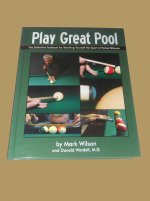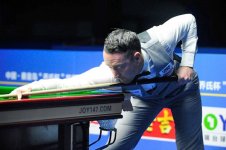Great thread.
I've come to many of the same conclusions as the original poster but I haven't been able to come up with the right words (or thread) to properly express these thoughts.
So let me try now. I'm just going to jump right in to controversial waters:
I bought the book that everyone has been recommending on here -- Mark Wilson's Play Great Pool and while it is a very well put together book and a great addition to anyone's pool library, I found some of the conclusions that Mark came to -- to be a bit puzzling.
The main thing that puzzled me was how he sort of just dismissed the "open" snooker style stance for pool but later on in the book he cites Steve Davis and Allison Fisher as examples of great players who apparently succeeded in spite of their open stances and not because of them.
My second criticism of this book is Mark spends a whopping 2 pages on the grip. That's out of 234 pages. This book is supposed to be the "Definitive Textbook for Teaching Yourself the Sport of Pocket Billiards" but yet Mark only spends a couple of pages on the subject and doesn't really dive too deeply into the different ways a player can grip the cue. I have personally found much better information on the grip right here on this very forum from both Fran Crimi and SFleinen. Unfortunately, I can't quite find the posts I'm thinking of at the moment.
I guess for me it looks like the vast majority of the successful instructors in the U.S. are coming from the Jerry Briesath tree. My impression of these instructors is that your stance doesn't matter a whole lot -- it just has to be comfortable. Your head position can be high or low. Your grip doesn't matter much -- just keep it light. The follow through doesn't matter of course because the cue ball is long gone nanoseconds after contact. The stroke is where it's at for these guys (and gals). A nice repeatable stroke is the goal. It just appears to me that they often times begin with this end result in mind, as they should, but they don't give proper credit to the importance of many of the fundamental items listed above. The overall impression I get is that if you just focus on not dropping your elbow and finish your stroke, all the other items will take care of themselves (stance, grip, head position, etc.).
The more rigid (if that's the right word) type of instructors don't focus so much on the repeatability of the stroke right off the bat, although that's still the ultimate goal. What these types of instructors do is put your body in an uncomfortable position and through the stance and grip you force yourself to stroke straight. Not the other way around.
These two methods seem to be diametrically opposed.
The only thing I'm really convicted off anymore is that at the top level pool tables will continue to get tougher (i.e. tighter pockets and/or bigger tables) and pool players will evolve to look more like their snooker cousins -- not less.
Well I take that back -- maybe it doesn't even matter. Maybe, just maybe -- all roads lead to Rome when it comes to shooting styles for pool. I honestly don't know anymore. In the pool world, it all just seems so arbitrary. It's like a few guys got together in a room one day and said this is what we are going to teach and come hell or high water we will not deviate! It's when you really start to analyze these different techniques that things start to get more confusing -- not less.
The snooker world doesn't appear to be so confusing. I wonder why that is?
I've come to many of the same conclusions as the original poster but I haven't been able to come up with the right words (or thread) to properly express these thoughts.
So let me try now. I'm just going to jump right in to controversial waters:
I bought the book that everyone has been recommending on here -- Mark Wilson's Play Great Pool and while it is a very well put together book and a great addition to anyone's pool library, I found some of the conclusions that Mark came to -- to be a bit puzzling.
The main thing that puzzled me was how he sort of just dismissed the "open" snooker style stance for pool but later on in the book he cites Steve Davis and Allison Fisher as examples of great players who apparently succeeded in spite of their open stances and not because of them.
My second criticism of this book is Mark spends a whopping 2 pages on the grip. That's out of 234 pages. This book is supposed to be the "Definitive Textbook for Teaching Yourself the Sport of Pocket Billiards" but yet Mark only spends a couple of pages on the subject and doesn't really dive too deeply into the different ways a player can grip the cue. I have personally found much better information on the grip right here on this very forum from both Fran Crimi and SFleinen. Unfortunately, I can't quite find the posts I'm thinking of at the moment.
I guess for me it looks like the vast majority of the successful instructors in the U.S. are coming from the Jerry Briesath tree. My impression of these instructors is that your stance doesn't matter a whole lot -- it just has to be comfortable. Your head position can be high or low. Your grip doesn't matter much -- just keep it light. The follow through doesn't matter of course because the cue ball is long gone nanoseconds after contact. The stroke is where it's at for these guys (and gals). A nice repeatable stroke is the goal. It just appears to me that they often times begin with this end result in mind, as they should, but they don't give proper credit to the importance of many of the fundamental items listed above. The overall impression I get is that if you just focus on not dropping your elbow and finish your stroke, all the other items will take care of themselves (stance, grip, head position, etc.).
The more rigid (if that's the right word) type of instructors don't focus so much on the repeatability of the stroke right off the bat, although that's still the ultimate goal. What these types of instructors do is put your body in an uncomfortable position and through the stance and grip you force yourself to stroke straight. Not the other way around.
These two methods seem to be diametrically opposed.
The only thing I'm really convicted off anymore is that at the top level pool tables will continue to get tougher (i.e. tighter pockets and/or bigger tables) and pool players will evolve to look more like their snooker cousins -- not less.
Well I take that back -- maybe it doesn't even matter. Maybe, just maybe -- all roads lead to Rome when it comes to shooting styles for pool. I honestly don't know anymore. In the pool world, it all just seems so arbitrary. It's like a few guys got together in a room one day and said this is what we are going to teach and come hell or high water we will not deviate! It's when you really start to analyze these different techniques that things start to get more confusing -- not less.
The snooker world doesn't appear to be so confusing. I wonder why that is?

